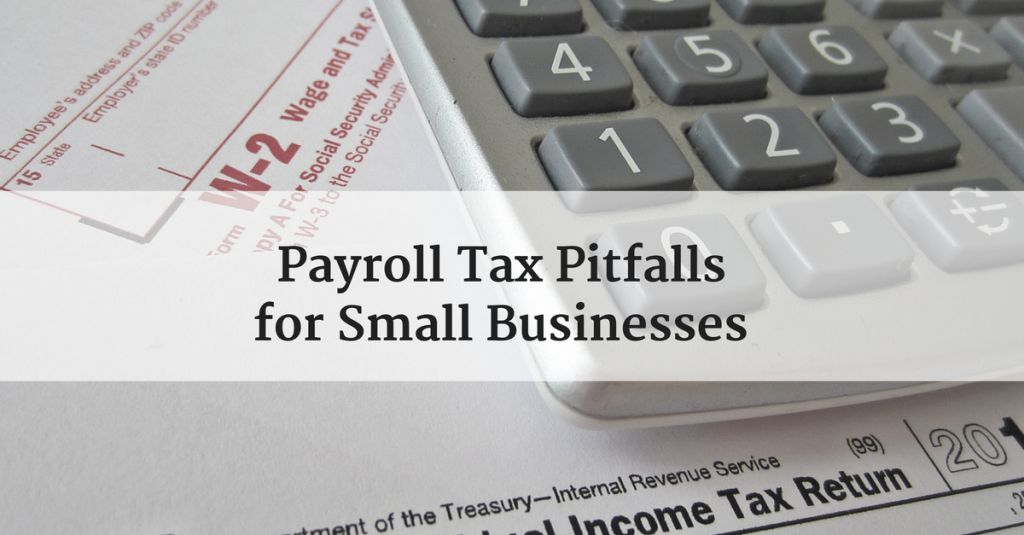If your small business is booming to the point where you have employees on your payroll, congratulations! With many small businesses starting in the garage or living room of the business owner, it is a sure sign of growth when you bring employees onboard.
However, with this exciting milestone comes the obligation to pay employment taxes. While that may sound simple, accounting for federal and state income tax, social security, Medicare, and federal and state unemployment tax can become quite complicated – especially now that the IRS is looking at small businesses with a careful eye to make sure they are properly reporting and filing payroll taxes.
The last thing you need is scrutiny from the IRS. Failure to manage your payroll taxes accurately not only puts you at risk of having costly tax debts and penalties, it can lead to the demise of the business. To help you avoid these complications, we’ve compiled a list of the most common payroll tax pitfalls small business owners face.
#1 Making Late Deposits
Your business is required to deposit the payroll taxes you collect on either a monthly or semiweekly schedule. At the beginning of each calendar year, you must decide which of the two schedule options your business will use based on IRS guidelines. That decision is not always easy to make because the schedule is not based on how often you do payroll, but on the total tax liability your business reports on Form 941.
The process of depositing payroll taxes can confuse anyone who does not have a complete understanding of payroll tax guidelines. It is worth getting professional help to understand which schedule your business must follow. Missing a deadline starts the clock on payroll tax penalties that can add up quickly and create a burdensome tax debt for your business.
#2 Paying Unemployment Tax Incorrectly
As an employer, you must report and pay both federal and state unemployment tax (FUTA and SUTA). Unlike federal income tax, social security and Medicare taxes — which come out of employee earnings — unemployment tax is paid directly from your business funds.
Sadly, many small business owners don’t know that there is a legal cap on the amount of unemployment tax they have to pay each year. If they overpay, they do not receive a refund. Also, state unemployment tax can be trickier than federal unemployment tax because it is not as standardized. States have their own tax rates and rules, as well as their own required documents that businesses must file. This is another area where it is worth seeking the help of a professional to avoid making an incorrect payment.
#3 Using Payroll Tax Withholdings to Pay Business Expenses
Many small business owners are tempted to “borrow” funds set aside for payroll taxes to help the business get through a financial crunch. While it may seem like a good idea at the time, the IRS considers it a major “no-no”. Technically, those funds belong to the government. Owners put themselves at risk of civil and criminal penalties and can be held personally liable for spending payroll tax withholdings.
#4 Categorizing Employees as Independent Contractors
Small business owners have an obligation to accurately categorize whether an individual is an independent contractor or an employee. Because owners are not required to withhold payroll taxes from independent contractors, it can be tempting to classify employees as independent contractors. If you do this, you put yourself at risk of incurring significant penalties. Not only will you be liable for paying the unpaid payroll taxes plus interest, you could also face fines and criminal prosecution.
Typically, an individual meets the criteria of an independent contractor if they:
- Supply their own equipment, materials and tools
- Do not receive materials required to perform their duties from the employer
- Work without close supervision
- Set their own work hours
- Are paid by the job rather than by the hour
- Perform duties on a temporary basis
- Work for more than one business
States examine these and other factors together when deciding whether a worker is an employee or an independent contractor. No single factor is necessarily decisive. Adding to the confusion, the state and federal tests are not always identical. If you are confused about whether an individual who works for you should be classified as an employee or independent contractor, talk to a tax professional about the terms of your working relationship.
#5 Not Distinguishing Between Reporting and Depositing
As a small business owner, you are required to meet specific deposit and reporting requirements for each of the payroll taxes you withhold from your employees’ paychecks. For some of those taxes, you may even have to match the amount you withhold. Reporting the amount of federal income tax, state and local income tax, social security, Medicare and unemployment tax you pay is a separate process from depositing those funds with the appropriate tax authority. Reporting shows the government the amount you owe. Depositing sends them the correct amount according to the required schedule. Each process has unique deadlines and guidelines you must follow to be in compliance. Working with a tax professional to understand these different processes can help eliminate confusion and future headaches.
What to Do If Your Small Business Gets Audited
If an audit reveals that your business owes payroll taxes, it is in your best interest to seek professional help as soon as possible. Dealing with the IRS or local tax authority on your own can be intimidating—especially when interest, penalties, and fines are involved. You have a legal right to appoint a representative to negotiate with the government on behalf of you and your business.
You worked hard to get your business to the point where you can offer job opportunities to employees. We hope the information we have presented here helps you better navigate your payroll tax obligations so they don’t become a roadblock to the continued success of your business.
